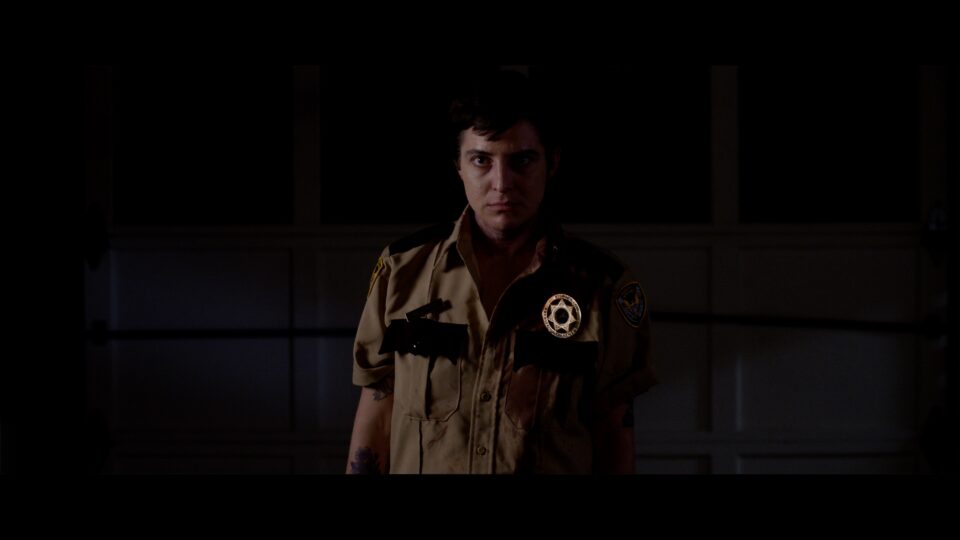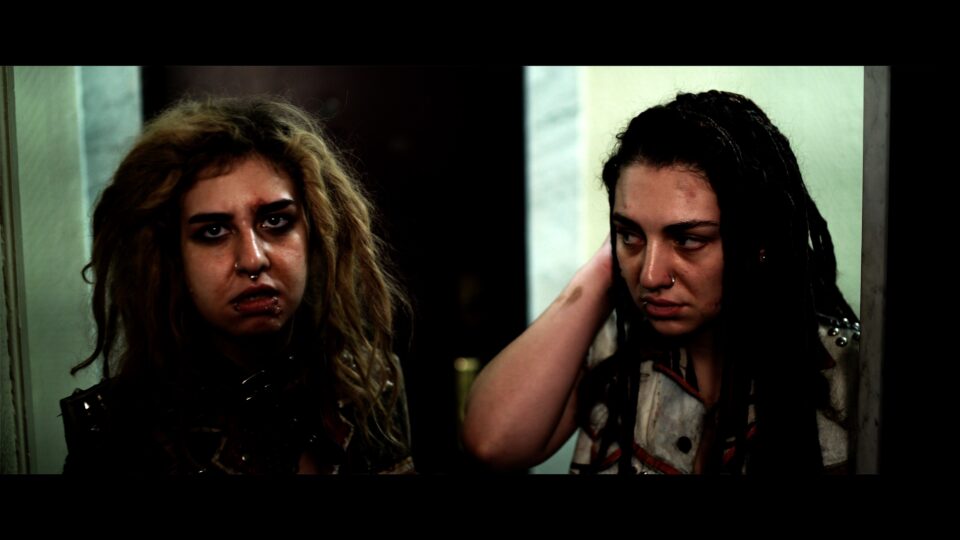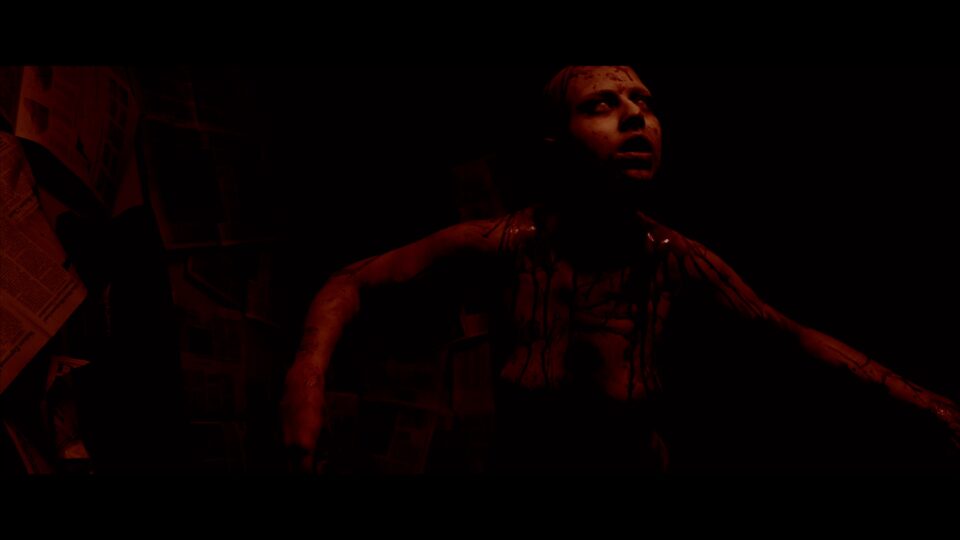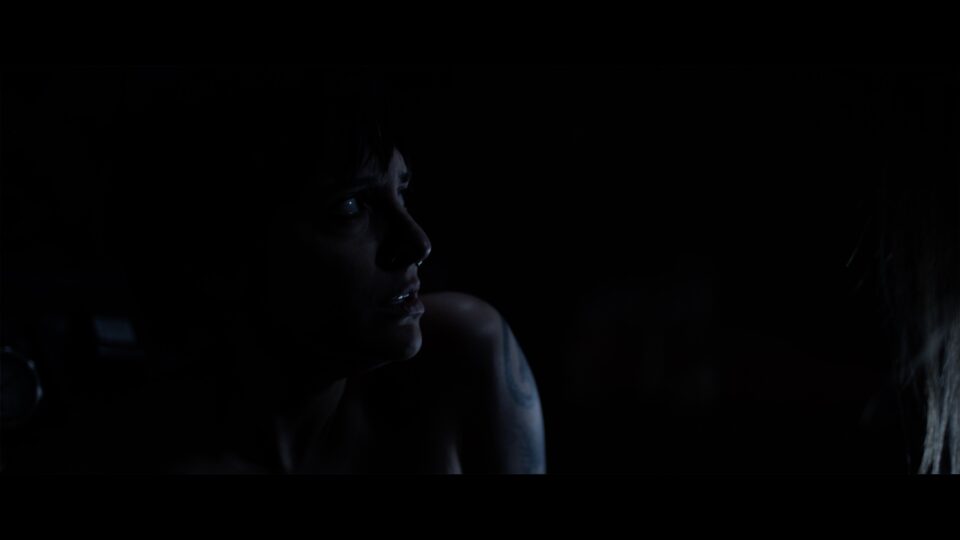Grindhouse Cinema Is Alive in ‘Bishop’s Cove’ [New Blood Reviews]

I believe there comes a time when everyone discovers they’re in one of two camps: those who prefer their horror absent of gratuitous bodily dismemberment and brutal torture, and those who bump a movie’s rating up a few points just for having an abundance of it… y’know, Gorehounds.
I’m a Gorehound, so I believe grisly violence can and does elevate certain films. Could you imagine if The Thing had tamer, less bloody transformations? If The Last House on the Left cut away from the abuse our unfortunate heroine faced? If Carnosaur didn’t have a muppet tear a chained-up woman’s leg off and eat it like a chicken leg? They wouldn’t be nearly as impactful. This content, especially in the more exaggerated instances, does something to the leftover lizard portions of our brains, giving us an outlet to confront such atrocities in a way that’s entertaining… or unnerving. Both, in the best cases. You guys get me, don’t you? Not waiting for an answer, let’s talk about Bishop’s Cove.
Bishop’s Cove
(Directed by Charles D. Lincoln; Starring Emily McKinley Hill, Anna Paulette, Chelsea LaSage; 2023)
In the film:
“Heather’s happy life is interrupted when asked to deliver the ashes of a long ago love to the small Upstate New York town of Bishop’s Cove. While there, she is forced to confront her past and demons both personal and literal.”
As far as “uncomfortable” cinema goes, The Last House on the Left is one of the PRIME cultural touchstones. But perhaps some of you thought there might be another reason I mentioned it specifically, instead of some similar movie. Well, congratulations, because you’re right.
Director Charles D. Lincoln is the son of Fred J. Lincoln, who took on the role of Weasel in the original The Last House On The Left. One could say that grindhouse cinema runs in his blood, and he doesn’t waste a drop of it as he bleeds this influence all over Bishop’s Cove. Make no mistake, this IS a grindhouse flick through and through, with all the hallmarks of the genre. Grit, cruelty, heavy helpings of exploitation, the works; it’s all there.

Also Read: ‘Roadkill’ Review: Modern Exploitation With Mixed Messages
This is a MEAN movie. It’s intended to be, like many of its contemporaries such as August Underground, American Guinea Pig Project, and Headless. However, unlike these examples—which mostly use what slim narratives they have to get from one gore scene to the next, a perfectly acceptable style—Bishop’s Cove does its best to equally ratio its grisly scenes with ones more dedicated to its narrative. This is admirable, given that it’s so easy to fall into the gore/torture aspect and leave it at that. An audience exists for that sick shit (me included), so there’s a good chance it’ll at least get noticed. Lincoln has a story to tell, though, and wants to spread a message. Does he succeed? That’s probably in the eye of the beholder, supposing they still have eyes at the end of the gruesome ride.
We have an ex-drug addict named Heather (Emily McKinley Hill) who’s tasked with taking the ashes of Catalina (Anna Paulette), her former friend, to her parents, despite them not having spoken to each other in years. So yeah, already weird right off the bat, but Heather hopes to alleviate her guilt over the way she treated Catalina. Call it penance. (Un)surprisingly, she finds herself involved in the parents’ VERY hands-on grieving process. Funny how that works out.

Also Read: ‘Fog City’ Review: A Rage-Fueled Bloodbath Bogged Down By Bad Performances
First things first: some people might be put off by the depictions of relentless abuse towards women this film presents. The amount of shit Heather goes through is borderline ludicrous, with the amount of time she spends nude becoming uncomfortable by the halfway mark. Gives me real No Reason vibes. It’s disturbing how much of this movie is violent towards women, but it’s supposed to be. It doesn’t present the torturers as virtuous at any point; the film never seems to condone their twisted idea of justice. We make mistakes, bad ones sometimes, but that doesn’t mean we deserve to be barbwired to a table and endlessly tormented for eternity, no matter what reasoning the wronged party has in the film. Like his father before him, Lincoln is a composer of disgust. He’s doing it on purpose.
However, I can see that not being enough to tolerate the imagery, which is understandable. The same concerns have been brought up with other films in the genre—I Spit On Your Grave, Thriller: A Cruel Picture, I Drink Your Blood, just to name a few. Whether or not the means justify the ends is up for you to decide.
Also Read: ‘Femme’ Review: An Alluring Queer Revenge Thriller
As I said earlier, there’s a message here, one dealing with the process of overcoming addiction and the atonement for one’s past sins. And BOY, does Heather have a LOT to atone for. When Bishop’s Cove starts off, she seems like a nice enough person, and this stays consistent throughout the feature. But the fact is even kind people who mean well can still destroy someone’s life through poor decisions and clouded judgment. Then again… there’s a big difference between a friend accidentally love-tapping your car, and a friend getting you addicted to drugs. And an even bigger difference between an honest mistake, and cutting someone out of your life to languish in the pit you dug them.
That’s the story aspect, told mostly through flashbacks with the modern-day element reserved for horrible agony and demonic torment. Yes, you read that right, DEMONIC. Put a pin in that. Essentially, everything happening to our hero serves in contrast to those acts she committed under the influence of hard drugs in her youth.

Did I mention Bishop’s Cove is MEAN? Because it is! Very mean, with much of the runtime spent following Heather naked and afraid, being mercilessly tortured not only by her human captors and the demons of her past, but also by a literal fucking demon. A demon who has several lesser demons in tow that look cool as hell, like something out of a Clive Barker-inspired porno, or an average Clive Barker short story. These lil’ hellions are the best part of the movie, being creative and brought to life through practical FX, looking beautiful in a ghoulish abomination kind of way.
Also Read: ‘The Caller’ Review: This Film Should Have Aired on Lifetime
Guess I should touch on the acting a bit. It’s more solid in some parts than others, with Willow Lautenberg (who plays Heather in the flashbacks) and Anna Paulette (as Catalina) effectively expressing the kinship between two frightened women in a cold world and the destruction of that kinship. Emily McKinley Hill does a great job portraying someone trying hard to overcome their past so they can move on with their life. Beyond these performances, three other aspects stuck like knives in my brain basket.
First, Charles Lincoln himself appears as the absolute bastard of a drug dealer, keeping in the tradition of his father portraying sadistic villains in their films.
Second, the duo playing Catalina’s parents (Nana Gouvea and Robert Asencio) seem a bit young for the roles. They look like they’re around the same age as their daughter, and it was noticeably off-putting at first. Turns out, at least for Gouvea, that’s not the case at all, and she’s completely age-appropriate for the part. There’s aging gracefully, then there’s being a goddamn vampire, and I have my suspicions about Gouvea.
Lastly, Chelsea LeSage’s portrayal of the demon (known as The Nameless) was the best performance in the entire film. She’s unnerving, with a slasher smile that’d put even some of the heaviest hitters to shame. Sure, a good chunk of the character is based on Regan of The Exorcist fame, but LeSage makes it work, giving one of the most memorable performances I’ve seen in indie horror cinema this past year.
Also Read: ‘Loop Track’ Review: A Paranoid and Unpredictable Horror Thriller
Now for some final observations before we wrap this up and you can go back to however you kill time when I’m not around.
There’s a contrived plot point that appears late in the runtime, and I honestly don’t know why it’s there. Nothing would have changed if it had been omitted, adding almost nothing to the bigger picture. The revelation is just there to give Catalina’s parents more “justification” for their actions, I guess? Or maybe it’s just there to pad out the length. Either way, it’s not needed.
The film ends on a bit of a downer, but I honestly don’t feel too bad for the characters involved. The only decent human beings shown are Catalina (who’s dead) and Heather’s girlfriend, who shows up briefly in the beginning and end.

When it comes down to how well the blade cuts, I’d say hilt-deep. Bishop’s Cove is a throwback to the grimy, mean, controversial grindhouse pictures of the 70s. If it were shot on film, I’m positive it’d look indiscernible from those flicks. Lincoln has truly created a modern-day video nasty, with a craftsman’s care and a butcher’s glee. If there’s a message to take from all this, it’s to never forget those who helped you navigate the tough road to self-improvement. They might need help, too.
Bishop’s Cove currently hitting the festival circuit, but once a release date drops, I’ll be sure to let you know!
Giallo Julian’s Twitter – Facebook – Letterboxd
Categorized: Reviews
